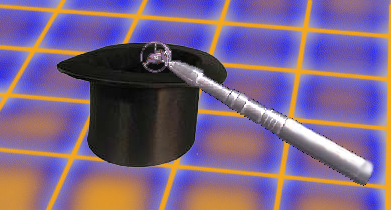Sonic sleight of hand : The 'magic' of MP3

Believe it or not, your MP3 player is actually playing a sonic magic trick on you. MP3 is a format, a way of storing sounds and music, so that they take up as small amount of memory in the computer as possible. That way you can have hundreds of your favourite tracks on your MP3 player, which is really just a small computer disc that stores the digital music. The trick is to find a way to remove some of the sound information without your ears and brain noticing it, in effect the clever audio systems engineers who developed MP3 are playing a trick on your ears.
Sounds like music
So how is the trick done? Well first we need to look at sound and music. Sound is a change in air pressure, so when Madonna sings her vocal cords change the air pressure and the sound wave passes to our ears. Our eardrum converts this wave of air pressure into a mechanical movement in the tiny bones in our ear. That in turn is changed into a nerve signal that goes to our brain. A microphone works in the same way. The pressure wave moves a part of the microphone called the diaphragm, and it's this movement that turns the sound pressure wave into an electronic signal. When we are recording digital music we take many millions of very rapid samples - measurements - of the electrical signal and turn it into numbers to store.
Frequency asked questions
One of the things that characterizes the sound wave is the frequency it is made of. Frequency means a regular repeating pattern. A very dull sound might just be a single frequency. The sound gets louder then softer, say every second, and repeats this cycle every second until you switch it off. This tedious sound would have a frequency of 1 Hertz (1 Hertz means one 'cycle' per second). Normal music doesn't sound at all like this dull repeating noise, but as it happens you can take any sound or music and, using some special mathematics, convert it into a set of different frequencies. Each of these frequencies alone just sound dull but added together it makes the music. The same idea is used in a music synthesizer; you can make the sound of any instrument by adding together the right frequencies. So we now know that our music can be described as frequencies, and we can start to play tricks.
Ear, Ear
Turns out that our ears, though very clever, don't do everything well. Certain frequencies will stop you hearing other close by frequencies. These special frequencies 'mask' the presence of the others nearby. Once you know this (it was discovered through lots of experiments on hearing), then you know there is no point in using up valuable computer memory storing information on the frequencies your ears can't hear. So you don't store them. Kazam! You remove these frequencies altogether, but because they were masked by the other frequencies you can hear, you don't notice they have vanished.
Bunny in the headlights
There is another cunning effect you can use. When we see a bright light, for a bit after it we cant see a dim light. Our eyes change so we aren't dazzled by the bright flash. But this leaves our ability to see dimmer lights reduced for a bit. Same happens with sounds. A loud sound will stop you hearing a quieter sound that follows just after. So again we can look at the digital music signal and work out all the places where a loud sound is followed by a quiet sound, and then cut the quiet sound out. Saves computer memory, and again the trick is that your ears won't notice the quieter sound is missing.

Sonic sleight of hand
It's using these tricks to vanish those parts of the sounds your ears won't notice are missing that gives MP3 its great ability to compress music. We need to store less data but the music sounds just as good. To be able to give the world MP3 Audio system engineers needed to work on ways to do the maths, as well as understand how our ears work. So the next time you listen to your MP3 player just think of all the maths and computing making up the wonderful din.
